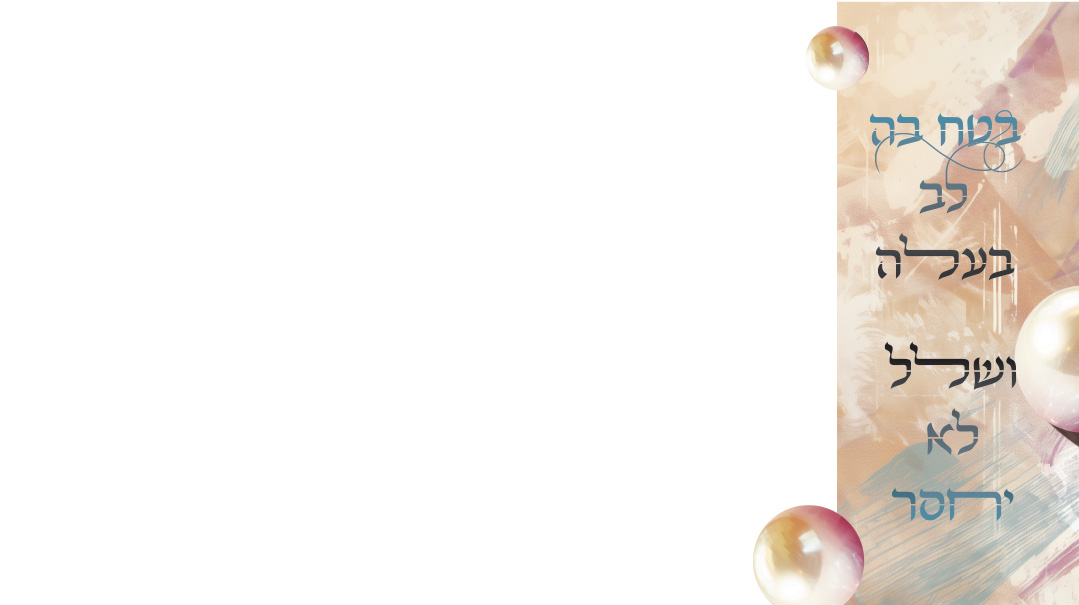True Wealth
| June 25, 2024In what ways can we authentically and positively support our husband’s spiritual growth?

True Wealth
Mrs. Shira Hochheimer sees Shlomo Hamelech’s timeless words as a guide to improving ourselves, which will in turn improve our relationship with our spouse and our children.
Society wouldn’t function without trust. We trust our neighbors with our mail and our butcher to sell us the correct cut of meat.
The closer the relationship, the deeper the trust. The Chovos Halevavos says that true trust means you can rely on another person to do what is best for you. This is the trust the Eishes Chayil’s husband has in her. The pasuk says, Batach bah lev baalah — her husband’s heart trusts in her. The heart is the organ that feeds all the other organs, enabling them to function. Spiritually, a person’s heart provides the motivation and feeling that drives all his choices. The Eishes Chayil’s husband knows that she will help him be his deepest possible spiritual self.
As a result, v’shalal lo yechsar — he will not lack wealth.
What is true wealth? Our money isn’t worth anything after 120. True wealth is only our reward in Olam Haba. The sefer Imrei Yaakov explains that the husband knows that his wife will do everything in her power to help him earn his World to Come. She will encourage him to learn Torah, do chesed, and give tzedakah.
We must have integrity when it comes to our husband’s trust, meaning that even if our ideal is to encourage our husbands to go out and learn as much Torah as possible, if a woman knows she is falling apart and he spends the next few days picking up the pieces, the next time she says to go, he won’t trust her and won’t leave.
We must also be authentic. Take the wife who wants a husband who bentshes slowly. She drops hints to slow down or praises him for his bentshing. This feels inauthentic to her husband because she’s not motivated by what’s good for him but by her own desires and expectations. Her husband won’t trust her when she encourages him to do other spiritual things when he senses she’s concerned about herself, not about him.
Instead, we live up to the ideal of the Eishes Chayil by supporting our husbands in ways that value and respect everyone. My friend Leah knew her husband really loved a certain chaburah. She rescheduled her exercise class and found ways to make her evenings at home fuller so she wouldn’t be lonely when he attended the chaburah. It took planning, but her husband goes to the chaburah feeling supported, guilt free.
Another friend has a husband who is always doing people favors. If someone needs help schlepping chairs or driving a carpool, he says yes. It means he is not at home as much as he could be, but by her giving permission, and not making snide remarks about how “nice” it is that he’s always helping people other than his family, she allows him to become an ish chesed.
Our husband’s deepest self wants to rely on us. We need to try to help him whenever possible to do that which will bring him the most good and help him become his best self. We aren’t doing this for our benefit or our ego, but only because we care.
In what ways can we authentically and positively support our husband’s spiritual growth?
Shira Hochheimer is the author of Eishes Chayil: Ancient Wisdom For Women of Today, a presenter for Torat Imecha Nach Yomi, and an administrator for WITS in Baltimore, MD.
Count on Her
Mrs. Debbie Greenblatt shows us what we can learn about a Jewish woman’s tremendous capabilities from Shlomo Hamelech’s descriptions of the Eishes Chayil, whatever stage of life she’s at.
The Metzudas Dovid explains that when a man isn’t home, he is free to pursue his worldly pursuits, as he doesn’t have to hurry home out of worry about what is lacking in the running of his home.
Batach is to trust, to be sure, to be secure.
The first strength of the Eishes Chayil is to be conscientious in her realm, so those who count on her can function and accomplish in their own realm.
This could be a mother who takes care of the needs of her children, seeing that they have their school uniform, or a healthy lunch, or the index cards the teacher requested. Or this could be a woman at work, whose skills and expertise create an environment of competence and allow the others in that space to flourish as well. This could also be a wife, who sees that the home runs, allowing the husband and other members of her household to go to school, their job, or the beis medrash, and be free to concentrate on what they have to do, with the surety of knowing that their home is a secure place, and will be ready for them to replenish and recharge upon their return.
Debbie Greenblatt is a senior lecturer for the Gateways organization and a teacher of both the observant and the not-yet-observant. She is also director of education at Core.
Vessel for Blessing
Mrs. Shira Smiles connects the pesukim of Eishes Chayil to the women in Tanach.
The Midrash teaches that this pasuk refers to the incident when Avraham and Sarah went down to Mitzrayim. Avraham told Sarah Imeinu to say she was his sister, not his wife, so that the Egyptians wouldn’t kill him, and she was taken to Pharaoh’s palace. Avraham was “compensated” for Sarah with livestock and riches. Thus, “her husband trusted in her” to be faithful to him, and “he did not lack spoils;” he left Egypt fabulously wealthy.
Abarbanel questions this seemingly simple interpretation. It would seem strange that Avraham Avinu would take wealth in exchange for his wife. Furthermore, we know that Avraham Avinu was careful to not even take a shoelace from Sodom, so why would he take anything from Pharaoh?
Therefore, explains the Abarbanel, we must understand something deeper. This story is teaching us the greatness of Sarah Imeinu. It was in her merit that Hashem blessed Avraham Avinu with great wealth. The Gemara (Bava Metzia 59a) teaches, “A person must always be careful about sustaining the honor of his wife, as blessing is found in a person’s house only because of his wife, as it is stated in allusion to this: ‘And he dealt well with Avram for her sake, and he had sheep and oxen’ (Bereishis 12:16). Not only did Sarah bring great brachah to her husband, she caused Pharaoh’s punishment as well. This was the greatness of Sara Imeinu, notes the Abarbanel; she was able to elicit blessing and curse as the situation warranted.
We now see Sarah Imeinu as the paradigm for all women who can bring blessing and goodness to their homes. Hashem has abundant blessing to bestow here on earth, but we must create receptacles to hold it. Rav Pincus ztz”l (Nefesh Chaya) sees Sarah’s greatness in the Torah’s description “hinei ba’ohel — behold, she is in the tent” (Bereishis 18:9). She filled her role graciously, staying within the kedushah of her home and guarding that holiness. Thus, when Yishmael presented a threat to that kedushah, she was proactive in urging Avraham Avinu to expel him. Rav Pincus ztz”l further explains that a man’s role is to fill his home with content — Torah and mitzvos — and a woman creates the framework to hold this kedushah.
Rav Moshe Shternbuch shlita understands the roles of men and women by way of a mashal. A king has his ministers and administrators who serve him in the royal court. He also has the royal guard, soldiers, and sentries who protect the country’s borders and citizens. Men are akin to the king’s ministers, while women are the royal guard. So men may seem to be more prominent, actively involved in community and institutional affairs, but women are the vital protectors, safeguarding and shielding their homes so that they are secure and healthy environments where Torah and holiness can flourish.
“Batach bah lev baalah — her husband trusts in her” is the calling of every Eishes Chayil to protect the Jewish home so that “ve’shalal lo yechsar — he will lack no spoils,” prosperity and blessing will be able to pour into the home.
Rebbetzin Shira Smiles is an adult lecturer in the Yerushalayim area, and a mechaneches in Darchei Binah Seminary. Rebbetzin Smiles is the author of five books, Torah Tapestries, which include extensive essays on each parshah.
(Originally featured in Family First, Issue 899)
Oops! We could not locate your form.







